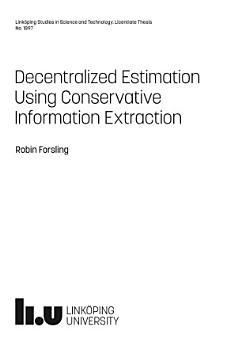Decentralized Estimation Using Conservative Information Extraction
Despre această carte electronică
In conservative estimation the unknown correlations are handled by ensuring that the uncertainty about an estimate is not underestimated. If this is ensured the estimate is said to be conservative. Neglecting correlations means information is double counted which in worst case implies diverging estimates with fatal consequences. While ensuring conservative estimates is the main goal, it is desirable for a conservative estimator, as for any estimator, to provide an error covariance which is as small as possible. Application areas where conservative estimation is relevant are setups where multiple agents cooperate to accomplish a common objective, e.g., target tracking, surveillance and air policing.
The first part of this thesis deals with theoretical matters where the conservative linear unbiased estimation problem is formalized. This part proposes an extension of classical linear estimation theory to the conservative estimation problem. The conservative linear unbiased estimator (CLUE) is suggested as a robust and practical alternative for estimation problems where the correlations are unknown. Optimality criteria for the CLUE are provided and further investigated. It is shown that finding an optimal CLUE is more complicated than finding an optimal linear unbiased estimator in the classical version of the problem. To simplify the problem, a CLUE that is optimal under certain restrictions will also be investigated. The latter is named restricted best CLUE. An important result is a theorem that gives a closed form solution to a restricted best CLUE. Furthermore, several conservative estimation methods are described followed by an analysis of their properties. The methods are shown to be conservative and optimal under different assumptions about the underlying correlations.
The second part of the thesis focuses on practical aspects of the conservative approach to decentralized estimation in configurations where the communication channel is constrained. The diagonal covariance approximation is proposed as a data reduction technique that complies with the communication constraints and if handled correctly can be shown to preserve conservative estimates. Several information selection methods are derived that can reduce the amount of data being transmitted in the communication channel. Using the information selection methods it is possible to decide what information other actors of the sensor network find useful.







